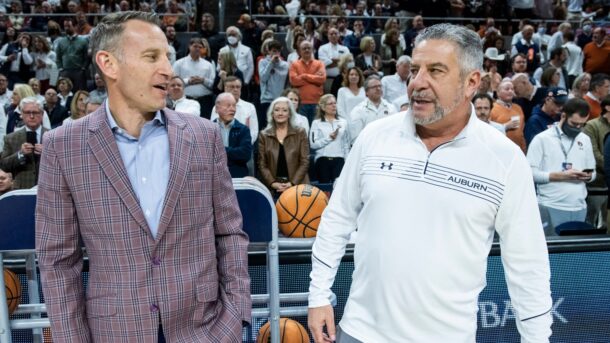
Hayes: More change is coming, and it’s all about money, power and the Power 5. Which means the SEC should be just fine.
By Matt Hayes
Published:
It’s all too much, too fast, too soon.
And it’s not over yet.
If you don’t like where college football is headed after an offseason of change, keep your hands and feet in the car. More change is coming.
“The adults in the room get to do whatever they want, apparently,” says Missouri coach Eli Drinkwitz.
Wait until the adults in the room — university presidents and Power 5 conference commissioners — take the next logical step in this offseason of change.
Embrace what you’ve forever known of college football for 1 more season, because soon enough, it won’t resemble anything you can remember.
A new Playoff, a new bowl structure and format, and maybe even another Playoff for the Group of 5.
“I don’t know how we, clearly on the outside looking in, ignore the obvious,” a Group of 5 athletic director told Saturday Down South. “Can we have a standalone (Group of 5) Playoff and sell it? I don’t think there’s any question.”
They’ve thought about it for nearly 2 decades, when it was clear that access to the BCS wasn’t a reality for non-BCS schools (see: Group of 5 conferences). It hasn’t been a reality for the Playoff, either (other than Cincinnati in 2021), and Group of 5 administrators see where this is headed.
Last month, SEC commissioner Greg Sankey told Saturday Down South he preferred all at-large selections in the new 12-team Playoff, which begins in 2024. That means no automatic qualifiers — which is how the G5 schools are guaranteed access to the new Playoff.
Sankey earlier this week reiterated his preference for all at-large selections on The Paul Finebaum Show. That preference holds more weight now with the contraction and elimination of the Pac-12 conference.
The initial format of the new 12-team Playoff — which begins in 2024 — was the top 6 conference champions and 6 at-large selections. The format guaranteed a spot for the highest-ranked Group of 5 champion.
But the G5’s 4 most prominent programs — Cincinnati, BYU, UCF and Houston — join the Big 12 in 2024, and the chasm between the 2 levels of FBS football grows wider with each season. Forget about Tulane’s win over USC in the Cotton Bowl; that can — and will — be brushed off as a disappointed Power 5 school with nothing to gain playing a Group of 5 school with everything to prove.
The Power 5 conferences — of which there are currently 4 for 2024 — understand the reality of the situation. Television wants the best games featuring the best college properties.
That means a format change in the Playoff is more than likely on the way. Specifically, the potential end of automatic qualifying.
But that’s only part of the equation. The rest, of course, is money.
The FBS commissioners haven’t decided the payout structure for the new Playoff, which is expected to fetch at least $1.2 billion annually for the remainder of the original Playoff deal (through the 2025 season). The Playoff will then increase in payout with the new deal beginning in 2026, a contract that will include multiple TV partners.
It appears the payout structure will be similar to the NCAA tournament, where schools earn “units” for making the tournament and then for advancing. That means those units — in a potential future annual deal of $1.5 billion or more — are golden.
You’re not automatically giving 6 teams an opportunity — or 5 with the expected end of the Pac-12 — to earn those units. Because there’s a significant difference in winning the SEC and Big Ten, and winning every other FBS conference.
And that’s just the beginning of what could be a crazy ride through the unintended consequences of college football’s structural paradigm change over the last 2 years.
Sankey told SDS last month that he prefers the Playoff selection committee to rank all teams, from 1-82 — regardless of winning or losing record — and those 82 teams would fill in the 41 bowl games.
“We had teams with losing records play in bowl games during the Covid season, and we had some highly competitive games,” Sankey said.
Mississippi State, Kentucky and Ole Miss all had losing regular season records in the Covid season of 2020. All 3 beat ranked teams — Tulsa, NC State and Indiana, respectively — in bowl games.
North Texas, Houston and Western Kentucky also played bowl games in 2020 with losing regular season records — and all 3 lost.
There are currently 65 Power 5 or equivalent schools for 2024, including Notre Dame. Even if all 65 Power 5 schools were given Playoff/bowl game opportunities (or even chose to accept with a losing season), that would leave 17 spots for Group of 5 schools.
There were 35 Group of 5 schools who advanced to bowl games in 2022.
The expectation is there will typically be 8-10 Power 5 schools who would choose to not play bowl games in poor seasons, or during coaching changes. That would then give more spots to Group of 5 schools.
That means the Group of 5 would lose about 10 spots from what they typically receive now.
“There’s a lot of traditions that we’ve had for a long time in college football,” said Alabama coach Nick Saban. “I think we’re in a time of evolution for whatever reason, and some of those traditions are going to get sort of pushed by the wayside, I think.”
And it’s not ever yet.
Matt Hayes is a national college football writer for Saturday Down South. You can hear him daily from 12-3 p.m. on 1010XL in Jacksonville. Follow on Twitter @MattHayesCFB







